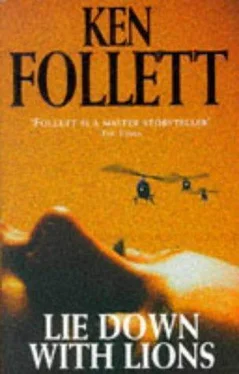Ken Follett - Lie down with lions
Здесь есть возможность читать онлайн «Ken Follett - Lie down with lions» весь текст электронной книги совершенно бесплатно (целиком полную версию без сокращений). В некоторых случаях можно слушать аудио, скачать через торрент в формате fb2 и присутствует краткое содержание. Жанр: Боевик, на английском языке. Описание произведения, (предисловие) а так же отзывы посетителей доступны на портале библиотеки ЛибКат.
- Название:Lie down with lions
- Автор:
- Жанр:
- Год:неизвестен
- ISBN:нет данных
- Рейтинг книги:4 / 5. Голосов: 1
-
Избранное:Добавить в избранное
- Отзывы:
-
Ваша оценка:
- 80
- 1
- 2
- 3
- 4
- 5
Lie down with lions: краткое содержание, описание и аннотация
Предлагаем к чтению аннотацию, описание, краткое содержание или предисловие (зависит от того, что написал сам автор книги «Lie down with lions»). Если вы не нашли необходимую информацию о книге — напишите в комментариях, мы постараемся отыскать её.
Lie down with lions — читать онлайн бесплатно полную книгу (весь текст) целиком
Ниже представлен текст книги, разбитый по страницам. Система сохранения места последней прочитанной страницы, позволяет с удобством читать онлайн бесплатно книгу «Lie down with lions», без необходимости каждый раз заново искать на чём Вы остановились. Поставьте закладку, и сможете в любой момент перейти на страницу, на которой закончили чтение.
Интервал:
Закладка:
"Why not?"
"Here—" He pointed to a place on the map, between the heads of two valleys, where Jane had blithely run her finger over a mountain range. "Here there is no saddle." A saddle was a pass.
Jane outlined a more northerly route. "This way?"
"Worse still."
"There must be another way out!" Jane cried. She had a feeling they were enjoying her frustration. She decided to say something mildly offensive, to liven them up a bit. "Is this country a house with one door, cut off from the rest of the world just because you cannot get to the Khyber Pass?" The phrase the house with one door was a euphemism for the privy.
"Of course not," said Mohammed stiffly. "In summer there is the Butter Trail."
"Show me."
Mohammed's finger traced a complex route which began due east of the Valley, proceeding through a series of high passes and dried-up rivers, then turned north into the Himalayas, and finally crossed the border near the entrance to the uninhabited Waikhan Corridor before swinging southeast to the Pakistani town of Chitral. "This is how the people of Nuristan take their butter and yogurt and cheese to market in Pakistan." He smiled and touched his round cap. "That is where we get the hats." Jane recalled that they were called Chitrali caps.
"Good," said Jane. "We will go home that way."
Mohammed shook his head. "You cannot."
"And why not?"
Kahmir and Matullah gave knowing smiles. Jane ignored them. After a moment Mohammed said: "The first problem is the altitude. This route goes above the ice line.
That means the snow never melts, and there is no running water, even in summer. Second is the landscape. The hills are very steep and the paths are narrow and treacherous. It is hard to find your way: even local guides get lost. But the worst problem of all is the people. That region is called Nuristan, but it used to be called Kafiristan, because the people were unbelievers, and drank wine. Now they are true believers, but still they cheat, rob and sometimes murder travelers. This route is no good for Europeans, impossible for women. Only the youngest and strongest men can use it—and even then, many travelers are killed."
"Will you send convoys that way?"
"No. We will wait until the southerly route is reopened."
She studied his handsome face. He was not exaggerating, she could tell: he was being dryly factual. She stood up and began to shuffle the maps together. She was bitterly disappointed. Her return home was postponed indefinitely. The strain of life in the Valley suddenly seemed insupportable, and she felt like crying.
She rolled her maps into a cylinder and forced herself to be polite. "You were away a long time," she said to Mohammed.
"I went to Faizabad."
"A long trip." Faizabad was a large town in the far north. The Resistance was very strong there: the army had mutinied and the Russians had never regained control. "Aren't you tired?"
It was a formal question, like How do you do? in English, and Mohammed gave the formal reply: "I'm still alive!"
She tucked her roll of maps under her arm and went out.
The women in the courtyard looked at her fearfully as she passed them. She nodded at Halima, Mohammed's dark-eyed wife, and got a nervous half-smile in return.
The guerrillas were doing a lot of traveling lately. Mohammed had been to Faizabad, Fara's brother had gone to Jalalabad. . . . Jane recalled that one of her patients, a woman from Dasht-i-Rewat, had said that her husband had been sent to Pagman, near Kabul. And Zahara's brother-in-
law Yussuf Gul, the brother of her dead husband, had been sent to the Logar Valley, on the far side of Kabul. All four places were rebel strongholds.
Something was going on.
Jane forgot her disappointment for a while as she tried to figure out what was happening. Masud had sent messengers to many—perhaps all—of the other Resistance commanders. Was it a coincidence that this happened so soon after Ellis's arrival in the Valley? If not, what could Ellis be up to? Perhaps the U.S. was collaborating with Masud in organizing a concerted offensive. If all the rebels acted together they could really achieve something—they could probably take Kabul temporarily.
Jane went into her house and dropped the maps in the chest. Chantal was still asleep. Fara was preparing food for supper: bread, yogurt and apples. Jane said: "Why did your brother go to Jalalabad?"
"He was sent," said Fara with the air of one who states the obvious.
"Who sent him?"
"Masud."
"What for?"
"I don't know." Fara looked surprised that Jane should ask such a question: who could be so foolish as to think that a man would tell his sister his reason for a journey?
"Did he have something to do there, or did he take a message, or what?"
"I don't know," Fara repeated. She was beginning to look anxious.
"Never mind," Jane said with a smile. Of all the women in the village, Fara was probably the least likely to know what was going on. Who was the most likely? Zahara, of course.
Jane picked up a towel and headed for the river.
Zahara was no longer in mourning for her husband, although she was a good deal less boisterous than she used to be. Jane wondered how soon she would marry again. Zahara and Ahmed had been the only Afghan couple Jane had come across who actually seemed to be in love.
However, Zahara was a powerfully sensual woman who would have trouble living without a man for very long. Ahmed's younger brother Yussuf, the singer, lived in the same house as Zahara, and was still unmarried at the age of eighteen: there was speculation among the village women that Yussuf might marry Zahara.
Brothers lived together, here; sisters were always separated. A bride routinely went to live with her husband in the home of the husband's parents. It was just one more way in which the men of this country oppressed their women.
Jane strode quickly along the footpath through the fields. A few men were working in the evening light. The harvest was coming to an end. It would soon be too late to take the Butter Trail anyway, Jane thought: Mohammed had said it was a summer-only route.
She reached the women's beach. Eight or ten village women were bathing in the river or in pools at the water's edge. Zahara was out in midstream, splashing a lot as usual but not laughing and joking.
Jane dropped her towel and waded into the water. She decided to be a little less direct with Zahara than she had been with Fara. She would not be able to fool Zahara, of course, but she would try to give the impression that she was gossiping rather than interrogating. She did not approach Zahara immediately. When the other women got out of the water, Jane followed a minute or two later, and dried herself with her towel in silence. It was not until Zahara and a few other women began to drift back toward the village that Jane spoke. "How soon will Yussuf be back?" she asked Zahara in Dari.
"Today or tomorrow. He went to the Logar Valley."
"I know Did he go alone?"
"Yes—but he said he may bring someone home with him."
"Who?"
Zahara shrugged. "A wife, perhaps."
Jane was momentarily diverted. Zahara was too coolly indifferent. That meant she was worried: she did not want
Yussuf to bring home a wife. It looked as if the village rumors were true. Jane hoped so. Zahara needed a man. "I don't think he has gone to get a wife," Jane said.
"Why?"
"Something important is happening. Masud has sent out many messengers. They can't all be after wives."
Zahara continued to try to look indifferent, but Jane could tell she was pleased. Was there any significance, Jane wondered, in the possibility that Yussuf might have gone to the Logar Valley to fetch someone?
Night was falling as they approached the village. From the mosque came a low chant: the eerie sound of the most bloodthirsty men in the world at prayer. It always reminded Jane of Josef, a young Russian soldier who had survived a helicopter crash just over the mountain from Banda. Some women had brought him to the shopkeeper's house—this was in the winter, before they moved the clinic to the cave—and Jean-Pierre and Jane had tended his wounds while a message was sent to Masud asking what should be done. Jane learned what Masud's reply had been one evening when Alishan Karim walked into the front room of the shopkeeper's house, where Josef lay in bandages, and put the muzzle of his rifle to the boy's ear and blew his head off. It had been about this time of day, and the sound of the men praying had been in the air while Jane washed the blood off the wall and scooped up the boy's brains from the floor.
Читать дальшеИнтервал:
Закладка:
Похожие книги на «Lie down with lions»
Представляем Вашему вниманию похожие книги на «Lie down with lions» списком для выбора. Мы отобрали схожую по названию и смыслу литературу в надежде предоставить читателям больше вариантов отыскать новые, интересные, ещё непрочитанные произведения.
Обсуждение, отзывы о книге «Lie down with lions» и просто собственные мнения читателей. Оставьте ваши комментарии, напишите, что Вы думаете о произведении, его смысле или главных героях. Укажите что конкретно понравилось, а что нет, и почему Вы так считаете.












